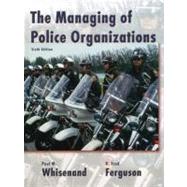
| (Note: Each chapter concludes with Competency Checkpoints and Flexing the Message.) | |
| Introduction | |
| The Value of Managing and Leading | |
| Character and Competency | |
| Authority and Power | |
| Emotional Intelligence = Two Domains + Four Capabilities | |
| Emotionally Mature Leaders Are Those Who Live a Purpose Driven Life | |
| Six Leadership Styles | |
| Which is the Best Leadership Style? Formal and Informal Leaders | |
| Followers | |
| Our Approach | |
| Leadership | |
| Values | |
| Maps and Compasses | |
| Values-Led Police Work | |
| Core Values | |
| Understanding and Respect Through Values | |
| Values: What They Are, Where They Come From, and How We Can Change Them | |
| Values: What They Provide for Us | |
| Identifying Our Values | |
| We Are What We Value and... | |
| Ethics | |
| Ethical Challenges | |
| There Is No Such Thing as Police Ethics | |
| Setting the Standard | |
| Why Ethics? Ethics = Moral Duties | |
| Courageous Choices | |
| Three Approaches | |
| Doing Ethics | |
| Ethical Dilemmas | |
| Ethics Training | |
| Values + Ethics = Vision | |
| Don't Pee in the Pool | |
| Vision | |
| Three Reasons that Police Agencies Get into Trouble | |
| Constancy of Vision and the Frequency of Change | |
| Vision: The Constancy of Mission and Values | |
| Two Approaches for Building a Vision Statement | |
| Strategy: The Constancy of Changing Goals | |
| Goal Setting | |
| Act Quickly; Think Slowly (A Greek Proverb) | |
| Communications | |
| The Four Main Reasons for Communications | |
| Formal Channels | |
| Informal Channels | |
| Four Directions | |
| Number of Messages | |
| Kinds of Messages | |
| Really Listening | |
| Communication Problems in the Information Age | |
| Team Empowerment | |
| Teamwork = Tough Leadership | |
| Pluses and Minuses | |
| The Police Leader as a Team Leader | |
| Empowerment: It Really Works | |
| We Don't Act on What We Know | |
| The Elasticity of Empowerment | |
| Empowerment = Delegation + Participation = Trust | |
| How Do I Know? Delegation | |
| Participation | |
| The Last Thing | |
| Vitality | |
| Vitality, Wellness, and Stress | |
| Stress and Police Leaders | |
| Stress: What Is It? Stressors: Sources and Types | |
| Stress Management for Vitality | |
| Intuition | |
| Anticipation: Analytical or Intuitive? Leveraging the Future | |
| From Even Higher Tech to Lower Touch | |
| From Bureaucracy to Agility | |
| From Expressed Ethics to Applied Ethics | |
| From ldquo;Irdquo; to ldquo;Werdquo; | |
| From Pay to Free | |
| From Retired to Rehired Temp | |
| From a Few Civilians to a Lot of Civilians | |
| From Some Participation to Full Empowerment | |
| From ldquo;Think Small, Act Bigrdquo; to ldquo;Think Big, Act Smallrdquo; | |
| From Service to Service Experience | |
| A Starting Place | |
| Management Principles | |
| Time Management | |
| The Total You | |
| Time-Bound Versus Timeless | |
| Time and Stress | |
| If It's Worth Doing, It's Worth Doing Poorly | |
| Four Generations of Time Management | |
| On Becoming a Category B Police Leader | |
| Organizing | |
| Control | |
| Organizations Defined | |
| The Bureaucratic Organization | |
| The Agile Organization and Management by Objectives | |
| The Ten Key Characteristics of an Agile Organization | |
| The Nine Basic Steps of Managment by Objectives | |
| Concluding Points: Agility and MBO | |
| Problem Employees | |
| How Many? We Choose Our Behavior | |
| Self-Deception | |
| How Do They Get Hired? How Do They Get Promoted? Types of Problems | |
| Drawing the Lines | |
| Problem Bosses | |
| Helping the Problem Employee | |
| Discipline | |
| Politics | |
| Govern | |
| Table of Contents provided by Publisher. All Rights Reserved. |
The New copy of this book will include any supplemental materials advertised. Please check the title of the book to determine if it should include any access cards, study guides, lab manuals, CDs, etc.
The Used, Rental and eBook copies of this book are not guaranteed to include any supplemental materials. Typically, only the book itself is included. This is true even if the title states it includes any access cards, study guides, lab manuals, CDs, etc.